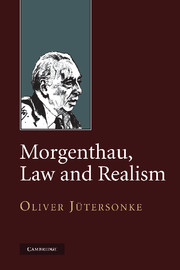Book contents
- Frontmatter
- Contents
- Preface
- Acknowledgements
- Note on the text
- 1 Hans J. Morgenthau in International Relations
- 2 The justiciability of disputes
- 3 Hans Kelsen and the reality of norms
- 4 Legal realism and behaviouralist social science
- 5 Legalism, romanticism and irresponsible statecraft
- 6 The legacy of legal formalism
- Name index
- Subject index
- References
3 - Hans Kelsen and the reality of norms
Published online by Cambridge University Press: 17 November 2010
- Frontmatter
- Contents
- Preface
- Acknowledgements
- Note on the text
- 1 Hans J. Morgenthau in International Relations
- 2 The justiciability of disputes
- 3 Hans Kelsen and the reality of norms
- 4 Legal realism and behaviouralist social science
- 5 Legalism, romanticism and irresponsible statecraft
- 6 The legacy of legal formalism
- Name index
- Subject index
- References
Summary
The previous chapter took a closer look at some of Morgenthau's early writings on the justiciability of disputes in international law. Morgenthau had diagnosed the international system as suffering from the struggle for power in a static system of international law unable to cope with the dynamic element manifested in the underlying ‘tensions’ that characterize the aspirations of states. In works published in 1934 and 1935, he would now shift his attention away from the justiciability of disputes and towards the recognition that the only way to curb the will to power through law was by means of an effective system of sanctions. Most striking about this period in Morgenthau's career is his sudden turn towards Hans Kelsen's theory of norms, not at all an approach that marks his early writings. The fact that he came into direct contact with Kelsen, who lectured at the Graduate Institute of International Studies in 1932 and then moved there a year later, is perhaps the most obvious reason for this change of focus.
This chapter will outline Morgenthau's miserable attempt to find his ground in Geneva, and will briefly discuss the work of Hans Kelsen and Arthur Baumgarten, both of whom arguably feature prominently in any redescriptive reading of Morgenthau's writings. Indeed, Morgenthau's engagement with the ‘reality’ of norms left a lasting mark on the way he thought about the role of law in the international arena, the potentialities and limits of norms to rein in the pursuit of power, as well as the prospects of attaining a world state.
- Type
- Chapter
- Information
- Morgenthau, Law and Realism , pp. 75 - 104Publisher: Cambridge University PressPrint publication year: 2010
References
- 1
- Cited by

